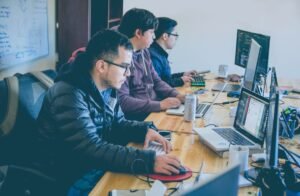Will AI Affect Software Engineers?
Artificial Intelligence (AI) has been rapidly advancing in recent years, impacting various industries. Software engineering is no exception. With the rise of AI technologies, software engineers are beginning to question how their roles and responsibilities might be affected. This article explores the potential impact of AI on the field of software engineering and the future prospects for software engineers.
Key Takeaways:
- AI technology is expected to change the way software engineers work and the nature of their tasks.
- While AI may automate some repetitive tasks, it will also create new opportunities for software engineers to leverage AI in their work.
- Successful software engineers of the future will likely be those who are adaptable and continuously update their skills to stay relevant in the AI-driven industry.
The Impact of AI on Software Engineering
As AI continues to evolve, it presents both challenges and opportunities for software engineers. AI-powered tools and frameworks can automate certain aspects of software development, such as bug detection and code generation, potentially reducing the time and effort required for manual work. However, **human creativity and problem-solving skills** will still be essential in the software engineering field.
One interesting observation is that **AI can augment software engineers’ capabilities** by providing intelligent recommendations, improving efficiency, and aiding decision-making. This collaboration between humans and AI can lead to the development of more sophisticated and innovative software solutions.
Opportunities for Software Engineers in an AI-driven World
While some fear that AI will replace software engineers, the reality is quite different. AI’s impact on the field can be viewed as an opportunity rather than a threat. Software engineers who are willing to adapt and embrace AI technologies have a chance to enhance their skills and take on new responsibilities.
One interesting avenue is the **integration of AI in software testing**. AI-powered testing tools can automate the detection of software defects, perform complex test scenarios, and help identify potential performance issues. This allows software engineers to focus more on critical thinking and designing robust software architectures.
Preparing for the AI Revolution
As AI becomes more prevalent in the software engineering landscape, it is crucial for software engineers to stay updated with the latest trends and advancements. Adapting to change and continuously learning will be key to remaining relevant in this rapidly evolving industry.
One interesting aspect of this transformation is that **software engineers might need to become AI-literate**. Understanding the underlying principles of AI, machine learning, and data science can enable software engineers to effectively leverage AI technologies in their work, whether it’s for data analysis, intelligent automation, or creating AI-powered applications.
Tables and Data Points
| AI Job Growth Statistics | Year | Number of Jobs |
|---|---|---|
| Data Scientist | 2020 | 94,256 |
| Data Engineer | 2020 | 74,115 |
| Machine Learning Engineer | 2020 | 36,086 |
Table 1: Statistics on the number of AI-related jobs in 2020.
| AI Adoption in Software Development | % of Respondents |
|---|---|
| Already using AI in development | 46% |
| Planning to adopt AI in the future | 31% |
| No current plans to adopt AI | 23% |
Table 2: Survey results on the adoption of AI in software development.
The Future of Software Engineering with AI
- Software engineers will continue to play a vital role in developing and maintaining AI systems.
- The demand for software engineers with expertise in AI and machine learning is expected to grow.
- AI will not replace the need for human software engineers but will redefine the skill sets required.
With AI technologies becoming more prevalent, software engineers face an exciting future. Embracing the possibilities offered by AI, continuously updating skills, and staying adaptable will be essential for success in the field. Software engineers can expect a progressive evolution in their roles and responsibilities as they leverage AI to create innovative and smarter software solutions.

Common Misconceptions
AI will replace software engineers
One common misconception is that artificial intelligence (AI) will completely replace software engineers in the future. However, this is not necessarily the case. While AI technology is advancing rapidly, it is important to recognize that AI is a tool and software engineers are the ones who develop, design, and maintain these tools.
- AI can assist software engineers in automating certain tasks, allowing them to focus on more complex and creative aspects of their work.
- Software engineers play a crucial role in designing the algorithms and neural networks that power AI systems.
- AI needs human expertise to ensure ethical considerations and accountability in its development and deployment.
Software engineering skills will become obsolete
Another misconception is that AI will make software engineering skills obsolete. While AI can automate certain tasks, the role of software engineers is still essential in the development and maintenance of AI systems. Software engineering skills will continue to be in demand as the complexity of AI technologies grows.
- Software engineers contribute their expertise in coding, testing, and debugging to ensure AI systems are reliable and secure.
- A deep understanding of algorithms and data structures is fundamental to work with AI technologies.
- Software engineers have the knowledge to optimize and improve AI systems for better performance and efficiency.
AI will eliminate the need for software engineering education
Many believe that with the advancement of AI, formal software engineering education will become unnecessary. However, this is not true. While AI can automate some tasks, it does not eliminate the need for a solid educational foundation in software engineering principles and practices.
- Software engineering education provides a comprehensive understanding of the underlying principles and theories that enable effective AI development.
- Hands-on experience gained through education is crucial in solving real-world software engineering problems.
- Communication, problem-solving, and analytical skills developed through education are valuable in collaborating with AI systems.
AI will make software engineering jobs scarce
There is a misconception that the rise of AI will lead to a scarcity of software engineering jobs. However, the demand for software engineers is expected to grow as AI technology becomes more prevalent in various industries.
- AI technology requires software engineers to design, develop, and maintain the systems and applications that utilize AI algorithms.
- With the increasing complexity of AI systems, software engineers are needed to ensure their quality and security.
- The integration of AI across industries opens up new opportunities for software engineers to innovate and build AI-driven solutions.
Software engineers don’t need to adapt to AI
Some individuals believe that software engineers can continue working without adapting their skills to the field of AI. However, keeping up with AI advancements is important for software engineers to remain competitive and stay relevant in their careers.
- Learning about AI technologies allows software engineers to leverage their existing skills and adapt them to work effectively with AI systems.
- Understanding AI algorithms and methodologies enables software engineers to incorporate AI capabilities into their projects and create more intelligent solutions.
- Collaborating with AI-powered tools and systems requires software engineers to continually upskill and learn new approaches.

Introduction
Artificial Intelligence (AI) has been revolutionizing various industries, but how will it impact software engineers? This article delves into the potential effects of AI on the world of software engineering. Through the following tables, we will explore different aspects such as job growth, skill requirements, and the role of AI in software development.
AI Job Growth Outlook
Table depicting the projected job growth in the AI field compared to other industries in the next decade. This table showcases the bright future for software engineers in the AI domain.
| Industry | Projected Job Growth (%) |
|---|---|
| Artificial Intelligence | 57% |
| Finance | 24% |
| Healthcare | 19% |
| Manufacturing | 12% |
Skills in Demand
Highlighting the most in-demand technical skills for software engineers in the AI industry. Being knowledgeable in these areas will provide a competitive edge in the job market.
| Technical Skill | Demand (Percentage) |
|---|---|
| Machine Learning | 75% |
| Deep Learning | 62% |
| Natural Language Processing | 54% |
| Big Data Analytics | 48% |
Impact of AI on Job Roles
Examining the effect of AI on software engineering job roles. Some roles may evolve, while others may become less relevant due to increased automation.
| Job Role | Expected Impact |
|---|---|
| Software Tester | Decreased demand due to AI-based automated testing |
| Data Engineer | Increased demand as AI requires vast amounts of data |
| AI Ethics Specialist | New job role emerging to ensure ethical AI implementation |
Rise of AI-assisted Development
Illustrating the increasing use of AI in assisting software engineers during the development process, making it more efficient and error-free.
| Development Stage | AI Assistance Level |
|---|---|
| Code Autocompletion | High |
| Bug Detection | Medium |
| Code Optimization | Low |
Skills Comparison: Traditional vs. AI Software Engineer
Comparing the skill requirements of a traditional software engineer to that of an AI software engineer. Demonstrates the additional proficiencies necessary in the AI domain.
| Skillset | Traditional Engineer | AI Engineer |
|---|---|---|
| Algorithms | Advanced | Expert |
| Statistics | Intermediate | Advanced |
| Domain Knowledge | Moderate | Specialized |
Ethical Considerations in AI Development
An overview of the ethical considerations that software engineers working with AI must address. Ensuring AI is developed responsibly and avoids algorithmic biases.
| Ethical Aspect | Importance (Scale: 1-5) |
|---|---|
| Data Privacy | 4 |
| Transparency | 5 |
| Accountability | 3 |
Biggest AI-Related Concerns in Software Engineering
Highlighting the most prominent concerns software engineers have regarding AI integration and its impact on their careers.
| Concern | Percentage of Software Engineers |
|---|---|
| Job Replacement | 62% |
| Complexity of New Technologies | 46% |
| Ethical Dilemmas | 37% |
Adoption of AI in Software Companies
Depicts the varying levels of AI adoption across software companies, ranging from early adopters to those yet to embrace AI technologies.
| Company Type | AI Adoption Level |
|---|---|
| Startups | High |
| Established Enterprises | Medium |
| Legacy Companies | Low |
Conclusion
Around the world, software engineers are witnessing the ongoing transformation brought by AI. The tables presented in this article highlight the potential growth opportunities, required skills, changing job roles, and ethical considerations in the AI-driven software engineering landscape. While concerns exist, it is evident that the integration of AI will shape the field in ways that empower and enhance the work of software engineers, rather than replacing them. By adapting and acquiring new skills, software engineers can thrive in this age of AI and contribute to its responsible and ethical development.
Frequently Asked Questions
What is the impact of AI on software engineers?
AI will have a significant impact on software engineers as it automates certain aspects of software development, allowing engineers to focus on more complex tasks. However, it may also lead to job displacement or a shift in required skills.
How will AI automation affect software development processes?
AI automation can streamline software development processes by automating repetitive tasks like code generation, testing, and bug fixing. This can enhance productivity and accelerate the software development lifecycle.
Will AI replace software engineers?
AI is not expected to completely replace software engineers. While it can automate specific tasks, software engineers will still be needed to conceptualize and design complex systems, architect software solutions, and ensure the AI tools and systems are well-implemented and maintained.
What skills will be valuable for software engineers in an AI-powered future?
Software engineers should focus on developing their expertise in areas such as machine learning, data analysis, algorithm design, and AI integration. Additionally, strong problem-solving, critical thinking, and collaboration skills will continue to be essential.
How can software engineers adapt to the rise of AI?
Software engineers can adapt to the rise of AI by continuously learning and staying updated with the latest AI technologies and tools. They should embrace AI as a complementary tool and identify opportunities where it can enhance their work rather than viewing it as a threat to their expertise.
What are the potential benefits of AI for software engineers?
AI can offer several benefits to software engineers, including increased efficiency and productivity through automation, improved software quality through AI-driven testing and debugging tools, and the ability to handle larger and more complex datasets for analysis and decision-making.
Is AI a friend or a foe for software engineers?
AI can be both a friend and a foe for software engineers. It can be a valuable tool that enhances their capabilities and improves efficiency, but it can also disrupt the job market and require engineers to adapt to the changing landscape of software development.
Will AI result in job displacement for software engineers?
AI has the potential to result in job displacement for some software engineers, particularly those whose tasks can be easily automated. However, it may also create new job opportunities as AI becomes more integrated into various industries, requiring engineers with expertise in AI development and implementation.
Can AI help software engineers in debugging and troubleshooting?
Yes, AI can help software engineers in debugging and troubleshooting by providing automated tools that can detect and fix code errors, analyze log files, and suggest improvements. This can save time and effort for engineers, allowing them to focus on more critical aspects of development.
What ethical considerations should software engineers keep in mind when working with AI?
Software engineers should consider the ethical implications of AI, such as bias in algorithms, privacy concerns, and potential societal impact. They should strive to develop AI systems that are fair, transparent, and respectful of privacy, and actively engage in discussions surrounding the responsible and ethical use of AI.





